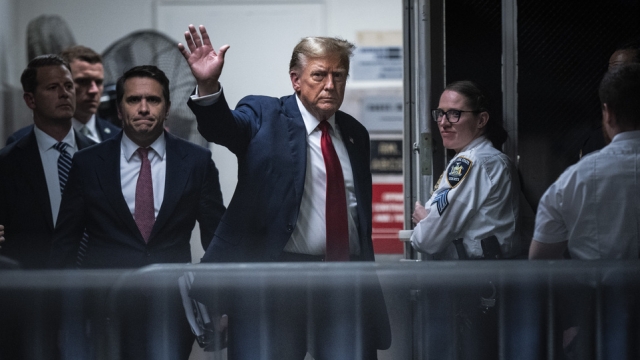Day one of former President Donald Trump's hush money criminal trial wrapped up on Monday, as 96 potential jurors all responded to a list of 42 questions. However, the selection process was not finalized, and proceedings are set to resume on Tuesday.
Trump faces 34 felony counts in a New York court for falsifying business records.
With Trump in the courtroom, prosecutors alleged that the former president violated an April 1 gag order not to make salacious comments about the Judge Juan Merchan's family on social media. They requested that Trump be fined a total of $3,000 for the alleged violations.
"We know that from various posts he had made,” prosecutor Christopher Conroy said, according to a pool report of the hearing. “We think it is important for the court to remind Mr. Trump is a criminal defendant."
Trump attorney Todd Blanche said that Trump did not violate the gag order and that he was "responding to salacious, repeated, vehement attacks by these witnesses."
Merchan said he will hear arguments over whether Trump violated the gag order on April 24. The judge is giving Trump's attorneys until Friday to formally respond to Conroy's allegations.
Before entering the courtroom Monday morning, Trump told reporters that this is a "political persecution."
“This is an assault on America, nothing like this has ever happened before, there’s never been anything like it," he said.
Trump sat at the defense table flipping through documents as the sides discussed the jury questionnaire.
Prosecutor Alvin Bragg said in a court filing that Trump tried to conceal an "illegal scheme to influence the 2016 presidential election." Bragg has alleged that Trump falsified records in an effort to prevent damaging stories from emerging during the 2016 presidential campaign. Bragg says Trump falsified records to hide payments to attorney Michael Cohen for him to pay Stormy Daniels, Karen McDougal and former doorman Dino Sajudin.
Bragg says business records relating to the payments were falsified in order to disguise the conduct.
Prosecutors say the Trump Organization paid Cohen in monthly installments and a year-end bonus check.
The charges Trump faces in New York are considered a Class E felony, the lowest among felony counts in New York. The charges are arguably the least serious among the four criminal cases Trump faces.
Trump has tried to delay this trial numerous times. On Monday, Merchan denied a motion from Trump's team to recuse himself.
SEE MORE: Trump set to begin criminal trial, first ever in the US
Trump has pleaded not guilty to the charges.
Selecting a jury could pose a challenge, given that Trump is a prominent political figure seeking the presidency this November.
The jury pool will consist of over 500 prospective jurors, Merchan said, in a process that could take up to two weeks. The first prospective jurors were questioned about things like where they get their news and their feelings about Trump. They were also questioned about whether they or a relative have worked for Trump, supported groups such as QAnon and Proud Boys, follow Trump on social media, donated to his campaign or attended a Trump rally.
In a February hearing, prosecutors and Trump's defense spent hours debating on questions to pose to the jury pool.
Merchan said questions to jurors should be about whether someone can be fair and impartial, adding that if jurors are eliminated based on their political parties, then the two sides will run out of jurors to strike. They will need to find 12 jurors and six alternates to serve.
Once a jury is selected, prosecutors and Trump's defense can begin presenting evidence and calling witnesses.
There is still a question regarding when opening statements will actually begin, and they may be delayed until May, which could force the former president to miss his son's high school graduation.
Trump's legal team requested permission from the judge for him to attend Barron Trump's mid-May graduation during the trial. But the judge couldn't commit to the date, citing uncertainty about the trial's duration.
Trending stories at Scrippsnews.com




